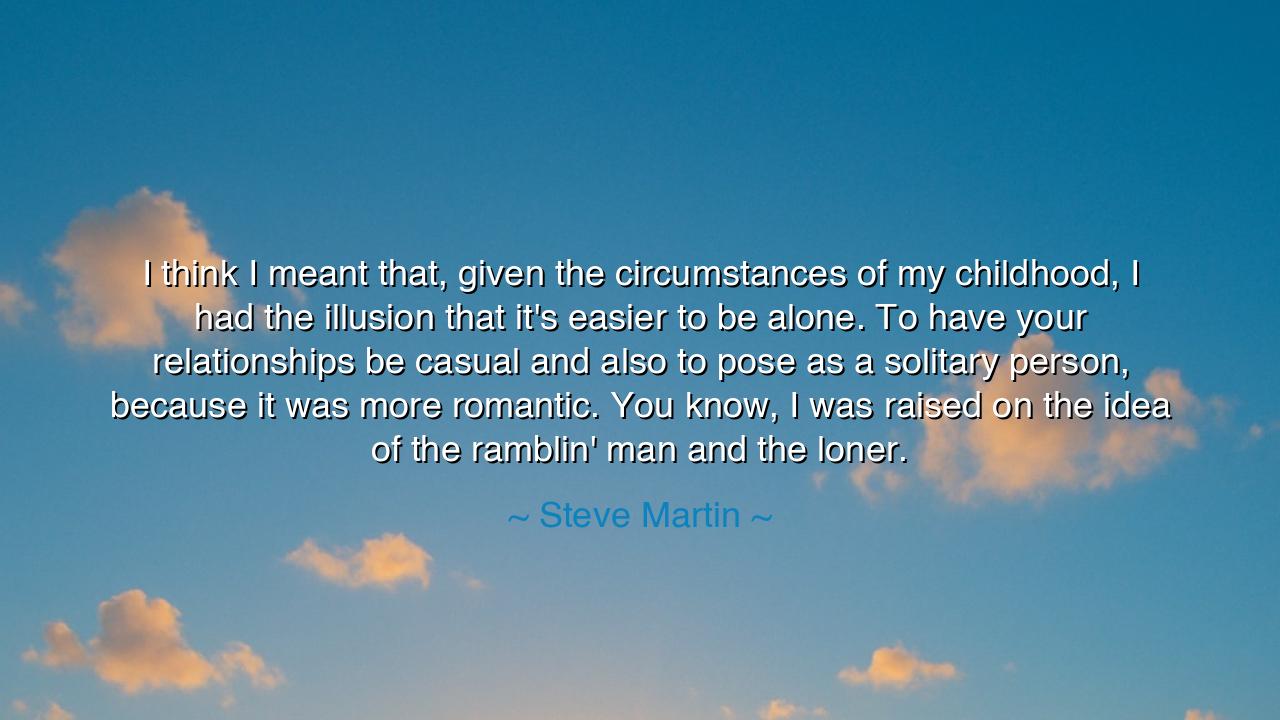
I think I meant that, given the circumstances of my childhood, I
I think I meant that, given the circumstances of my childhood, I had the illusion that it's easier to be alone. To have your relationships be casual and also to pose as a solitary person, because it was more romantic. You know, I was raised on the idea of the ramblin' man and the loner.






In the reflective and profoundly human words of Steve Martin, we glimpse the quiet confession of a man who has walked both the bright paths of success and the shadowed corridors of solitude: “I think I meant that, given the circumstances of my childhood, I had the illusion that it’s easier to be alone. To have your relationships be casual and also to pose as a solitary person, because it was more romantic. You know, I was raised on the idea of the ramblin’ man and the loner.” Within these words lies a timeless tension — the allure of independence and the ache of isolation, the romantic image of the solitary wanderer who seeks freedom, yet discovers that freedom without connection can become another kind of cage.
The origin of this reflection rests in Martin’s own journey through fame and self-discovery. Born into a household marked by emotional distance, he learned early the art of self-reliance, the protective armor of solitude. Later, as a performer and writer, he embodied the wit and precision of a man who understood the power of intellect but often wrestled with intimacy. His words are not a rejection of solitude, but a reckoning with its illusion — the idea that to stand alone is to be strong, that detachment is peace. Many, like him, have inherited this myth: that the loner is noble, unburdened by the chaos of love, free as the wind. Yet, as he discovered, that freedom can grow cold, and the heart, untended, begins to long for warmth.
The ancients, too, spoke of this paradox. The philosopher Aristotle wrote that man is a “social animal,” and that one who lives without connection is either a beast or a god. For to be human is to dwell between those extremes — capable of solitude, yet sustained by companionship. The Stoics valued self-sufficiency, but they never confused it with loneliness; they taught that the wise man seeks friendship not from need, but from harmony. In Martin’s words, we hear the modern echo of these truths: that the ideal of the ramblin’ man, the heroic loner who rides beyond attachment, is a mirage born of longing. The world has always romanticized the solitary figure — the wanderer, the outlaw, the artist — but beneath the myth lies the yearning for connection that no man escapes.
Consider the story of Ernest Hemingway, who too was raised on the gospel of stoic masculinity — the hunter, the soldier, the traveler. His life was filled with motion and solitude, and yet his letters reveal a man haunted by emptiness. He once wrote, “I never knew anyone I could talk to as I wanted.” The illusion of strength in aloneness became, for him, a prison of the spirit. Like Hemingway, Martin’s confession reveals not weakness, but awakening — the realization that the walls we build for protection often become the same walls that keep love from entering. The romance of solitude fades when it no longer shields us, but separates us.
To pose as a solitary person, as Martin describes, is to live half in truth and half in performance. It is to believe that vulnerability is danger, and that closeness will undo us. Yet what the wise come to learn — through loss, through time, through silence — is that to share one’s soul, even imperfectly, is the only path to belonging. True strength is not the absence of need, but the courage to admit it. True maturity is not the hardening of the heart, but its softening — the recognition that connection, though painful, is what keeps us alive.
There is also a deeper lesson here about illusion, one that speaks to the human tendency to mistake appearances for truth. The ramblin’ man — that romantic ideal of the self-sufficient wanderer — exists in countless myths because he embodies our longing to escape pain. Yet escape is not freedom. To flee love is to flee the mirror that reveals who we are. The artist, the thinker, the wanderer — all must one day turn inward and ask: “Am I alone because I choose truth, or because I fear it?” The illusion of ease in solitude is seductive, but as Martin teaches, it is only when we face our own longing that we find peace.
Therefore, my child, learn this sacred balance: seek solitude, but do not worship it. Be alone, but not unreachable. The quiet of the self is a holy place, but it is not a home forever. Let solitude refine you, not define you. For life is a dance between retreat and return — between the mountain and the marketplace, the hermitage and the hearth. The one who can stand alone and yet still love, who can wander freely and yet return without fear, has mastered both freedom and belonging.
So let Steve Martin’s confession become your wisdom: that the heart’s armor is not a crown, and that the myth of the loner is not the path to joy. You may walk alone for a time, as all must, but do not mistake that path for destiny. When the world invites you to share laughter, to love, to risk, accept it. For even the ramblin’ man must one day rest, and even the loner, in his quietest hour, dreams of being known.






AAdministratorAdministrator
Welcome, honored guests. Please leave a comment, we will respond soon